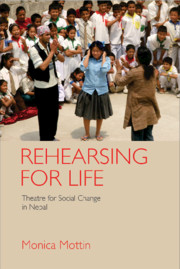Book contents
- Frontmatter
- Dedication
- Contents
- List of Tables, Figures and Boxes
- Acknowledgements
- Chapter 1 Theatre and Life: Theatre at the intersection of art, politics and international development
- Chapter 2 Spacing Out to Speak Up: Resistance, protest and the emergence of street theatre
- Chapter 3 The Streets Become the Stage: Performance, protest and theatre in a time of political crisis
- Chapter 4 Kachahari Natak: Fragments of an aesthetics of theatre for social change
- Chapter 5 Activism not Development Work: Explorations in Tharu kachahari natak
- Chapter 6 A Cultural Army for a Cultural Revolution: Maoist cultural programmes and revolutionary theatre
- Chapter 7 The Ordinariness of the Special: Towards the professionalization of theatre work
- Chapter 8 Conclusions
- Bibliography
- Index
Chapter 1 - Theatre and Life: Theatre at the intersection of art, politics and international development
Published online by Cambridge University Press: 05 April 2018
- Frontmatter
- Dedication
- Contents
- List of Tables, Figures and Boxes
- Acknowledgements
- Chapter 1 Theatre and Life: Theatre at the intersection of art, politics and international development
- Chapter 2 Spacing Out to Speak Up: Resistance, protest and the emergence of street theatre
- Chapter 3 The Streets Become the Stage: Performance, protest and theatre in a time of political crisis
- Chapter 4 Kachahari Natak: Fragments of an aesthetics of theatre for social change
- Chapter 5 Activism not Development Work: Explorations in Tharu kachahari natak
- Chapter 6 A Cultural Army for a Cultural Revolution: Maoist cultural programmes and revolutionary theatre
- Chapter 7 The Ordinariness of the Special: Towards the professionalization of theatre work
- Chapter 8 Conclusions
- Bibliography
- Index
Summary
This book is about social and political theatre in Nepal. In particular, it examines how everyday social problems and macro-political conflicts are both represented and challenged through drama-based performances. How are theatre and social reality (dis)connected? How can reflexivity and ambiguity allow for the aesthetic space to become a transformative place? What differentiates street theatre performed in planned development from street theatre performed within social and political movements? How can performance and dramatic action move communities towards social action? To answer these questions I delve into both aesthetic and social performance contexts of three types of theatre and performance for social change available to Nepali audiences in the mid-2000s: kachahari natak (forum theatre/street theatre), loktantrik natak (theatre for democracy) and Maoist political cultural programmes that may include krantikari natak (revolutionary theatre). In other words, the political theatre for democracy performed by Aarohan Theatre Group, development forum theatre performed by both Aarohan Theatre in Kathmandu and by the Kamlari Natak Samuha, a Tharu activist group, in the rural areas of western Nepal, the political performance of the Maoist cultural groups, all aim to bring about social change, but how are they similar and how do they differ?
Aarohan Theatre Group, a Kathmandu-based professional company and Gurukul, the theatre school associated with the group, is at the core of this ethnography. It is the main field site from which I tried to understand the world of theatre for social change in Nepal. To respond to what they describe as the ‘needs of the country’ Aarohan performed both political and street theatre in development projects. Loktantrik natak (theatre for democracy) was staged voluntarily within the popular movement led by civil society organizations that developed as a reaction to the king's coup and state of Emergency in 2005. Kachahari natak (forum theatre) was performed as part of donor-funded development projects. But project-funded development theatre was also a means for Aarohan and other theatre groups in Nepal to survive and continue developing their artistic stage productions. In fact, to develop theatre acting as a full-fledged profession in the emerging Nepali creative industries, Aarohan Theatre also staged high profile proscenium plays at their halls in Gurukul. If loktantrik natak represented the ‘special’, once off response to the urgency of the political threats, kachahari natak undoubtedly constituted the everyday, the ‘ordinary’ NGO-funded project work that financially contributed to the sustenance of Aarohan Theatre as an organization.
- Type
- Chapter
- Information
- Rehearsing for LifeTheatre for Social Change in Nepal, pp. 1 - 31Publisher: Cambridge University PressPrint publication year: 2017



